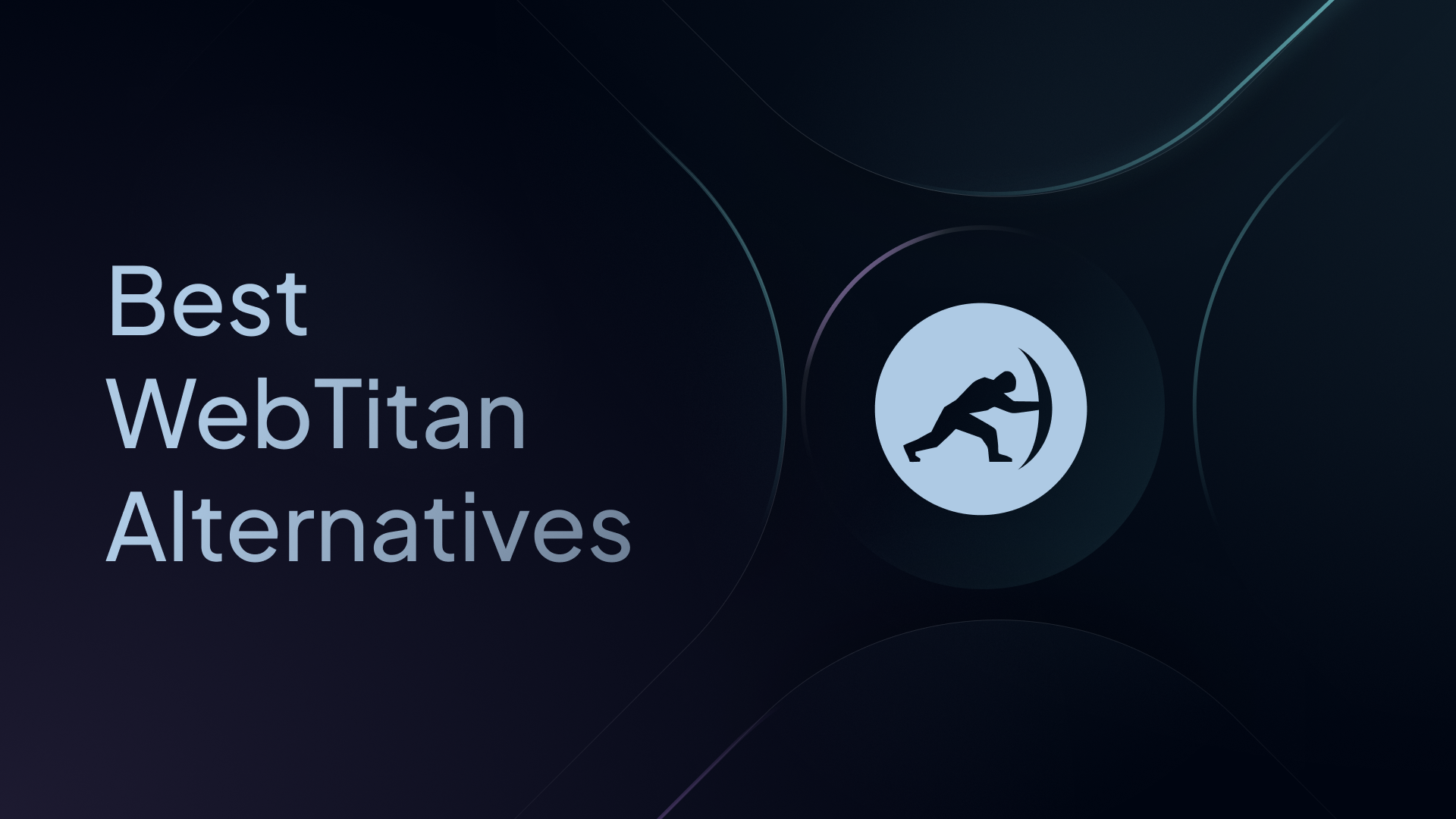Your DNS management solution should offer the perfect balance between functionality, affordability, and ease of use.
For a long time, WebTitan has been one of the go-to solutions for those very reasons, but these days it’s fallen behind.
They no longer offer the largest feature set and aren’t the most cost-effective solution either.
What solutions have taken its place?
Let’s find out.
Alternatives to WebTitan
WebTitan – TitanHQ’s DNS filtering branch – has been a stalwart in the DNS market since its genesis in 2009.
But, back then, there weren’t many other players in the industry. Nowadays, you can find many DNS solutions that can compete with WebTitan on all fronts.
These are our top alternatives to consider.
1. Control D (Best All-Round Solution)
Control D stands out as a versatile and robust DNS management service with powerful filtering capabilities, extensive customization options, and a user-friendly interface that simplifies network management at scale.
With an impressive range of features and capabilities, Control D gives businesses ultimate control over their network security.
Here’s a deeper look at what makes Control D a compelling choice.
Pricing
Both services keep it simple by not having tiered plans. Based on 100 users, WebTitan costs $2.47/user/month, with high user counts likely getting a better rate.
Due to TitanHQ offering a plethora of other solutions, you can also mix-and-match services to create a custom bundle. However, keep in mind that this will increase your monthly cost.
On the flip side, Control D offers a standard pricing model. Organizations are charged $2/user/month, MSPs are charged $1/user/month, and non-profits and schools can sign up for an even lower rate.
Control D wins in this category for its more cost-effective pricing structure.
Features
There is a significant overlap between Control D and WebTitan as they offer a similar set of features. Examples include:
- Advanced ML-based malware protection
- Flexible content blocking
- Per-user policies
- Per-user reporting
- Full API access
- RMM tool integration
- Active Directory support
But, there are a few features in Control D’s arsenal that WebTitan does not yet offer, such as:
- Compatibility with Linux, Android, and iOS systems
- 1,000 blockable Services
- Geo-custom rules
- Traffic Redirection
While WebTitan can compete on many features, it simply lacks the full repertoire of Control D, which is why Control D wins in this category.
Onboarding & UX
WebTitan follows the typical UI of a business-minded tool. However, these themes often come at the cost of user experience, and WebTitan is no different. Useful pages are hidden in menus with unnecessarily complicated navigation, which makes managing your DNS settings a hassle.
Control D takes an entirely different approach, first prioritizing the user experience and ease of DNS management and then working back from there. This can be seen in reviews where users applaud how easy the onboarding experience is. The UI has also seen a recent makeover, now boasting a modern look and finish.
Analytics & Reporting
Both services offer comparable analytics and reporting features, such as:
- Admin action logs
- Full query logging
- Ability to export query logs
- Scheduled Reporting
The main difference between the two services is that Control D offers SIEM log streaming capabilities, which WebTitan does not, and Control D gives you the option to choose a custom data storage region (for an additional cost).
Since SIEM log streaming is an essential feature for many organizations, we've given the nod to Control D.
Support
Control D has a bustling community that’s frequently active on its Discord, Reddit, and Feedback portal. They also offer chat support in the form of Barry, an advanced chatbot that can assist with almost all queries within seconds.
If human assistance is needed, Control D has a highly-rated customer support team that goes above and beyond to ensure your questions and issues are addressed promptly and thoroughly.
Final Thoughts
WebTitan is a solid, reliable DNS management solution whose offerings will cover most needs. However, it simply cannot compete with Control D as a total solution.
Control D takes the edge regarding pricing, features, onboarding and UX, and total support offered. That’s why Control D is voted the number one WebTitan alternative.

2. DNSFilter
DNSFilter is an established player in the DNS filtering market. It offers similar functionality to Control D, with a feature set including:
- AI-powered malware protection
- Flexible content filtering capabilities
- Full API access.
DNSFilter offers robust DNS query speeds, frequently challenging Cloudflare to be the fastest on the market. This is appealing for businesses focused on minimizing latency. However, this performance comes with trade-offs.
DNSFilter is often criticized for its lower server uptime and reliability. Additionally, its pricing structure can be a hurdle for those seeking an affordable option since features like exporting data, SIEM integration, and a permanent API token require the purchase of add-ons, starting at $0.25/user/month. It also lacks support for Linux systems, all modern DNS protocols, and dual-stack capabilities.
Although DNSFilter is often more expensive than competitors and lacks some core functionality, it remains a viable alternative to WebTitan due to its speed and content-filtering abilities.
👉 Read our in-depth comparison between Control D and DNS Filter.
3. Zorus
Zorus offers a straightforward, no-nonsense approach to DNS management, making it a practical choice for MSPs.
Its core offerings include essential features like malware and phishing protection, flexible web filtering, Geo-IP blocking, and full API access. This makes it a solid option for those who need reliable DNS filtering without the complexity of more feature-packed solutions.
However, Zorus does have some limitations that may be a drawback for businesses needing broader compatibility. It does not yet support Android or iOS devices, and its MacOS client remains in beta testing.
Additionally, unlike competitors such as Control D, Zorus lacks SIEM log streaming, which may be a dealbreaker for organizations that rely heavily on advanced logging and data analysis.
In summary, Zorus is a solid choice for those seeking a straightforward DNS solution with essential protections. However, if your needs extend to more diverse device support or require advanced integrations like SIEM, you might find more value with other providers.
4. SafeDNS
SafeDNS may not be as widely recognized as some of its competitors, but it offers a robust set of features.
The Basic plan covers key functionalities like:
- Full API access.
- Customizable content filtering.
- Basic protection against malware and phishing threats.
For those who need more, the Pro plan, priced at $1.8/user/month, includes features such as:
- Per-user policy enforcement and reporting.
- Mobile device compatibility.
- Integration with Active Directory.
For even more advanced needs, the Pro+ plan at $2.5/user/month adds support for SIEM integration, making it applicable for businesses that need advanced data handling and analysis.
It should be noted that SafeDNS lacks features like Geo-custom rules and Traffic Redirection, but despite that, it remains a solid alternative for those seeking a simple and effective solution.
5. DefensX
DefensX is a DNS security solution designed with MSPs in mind, offering a zero-trust approach to secure web browsing. Their service includes features such as:
- Flexible content filtering
- Full query logging
- Integration with RMM tools to streamline device management.
DefensX offers three subscription tiers – Core, Core+, and Premium – each with increasing levels of functionality. For example, features like SIEM log streaming, scheduled reports, and full API access are reserved for higher-tier plans.
Unfortunately, DefensX does not openly share its pricing details, making it difficult to assess how well it stacks up against competitors in terms of cost-effectiveness; you must book a demo and consult with their sales team to obtain detailed pricing and plan information.
While DefensX receives praise for its customer support, some users express dissatisfaction with the slow pace of feature updates and new developments.
This means that DefensX is a reliable option for businesses prioritizing strong support and basic DNS protection. However, those seeking a more transparent pricing model or faster innovation may want to explore other alternatives.
6. ScoutDNS
ScoutDNS is a straightforward DNS filtering service that offers several essential features for businesses looking to manage their web traffic.
It includes flexible content filtering, customizable allow/blocklists tailored to specific clients or policies, and full API access. These capabilities make it suitable for those who need a reliable DNS solution with basic control over web content.
However, ScoutDNS has some notable limitations. It does not support mobile devices, it lacks support for DNS-over-TLS (DoT) protocols, and does not provide Geo-custom Rules or Traffic Redirection capabilities.
While ScoutDNS can be an affordable option for businesses that require basic DNS management features, the omission of advanced features and compatibility makes it less ideal for those with more complex needs and use cases.
For those needs, alternatives like Control D may offer better value at a similar price point.
7. Cloudflare Gateway
Cloudflare Gateway is a DNS service geared mainly towards larger enterprises, forming a key part of Cloudflare’s broader Zero Trust suite.
It’s offered in three tiers: Free, Pay-as-you-go, and Contract. While the Free plan might appeal to small teams, it comes with limitations, like the absence of dedicated support and only 24 hours worth of query logs.
To access more robust features, most users will find themselves opting for the Pay-as-you-go plan, which starts at $7/user/month – a significant cost compared to other competitors.
The higher-priced plans come with a range of features, such as:
- Protection against malware and phishing
- Full API access
- Detailed query logging for better visibility
- Geo-IP blocking for location-based controls
- Compatibility with RMM tools
However, to unlock functionalities like SIEM log streaming and per-user reporting, users must upgrade to the Contract plan, which is likely charged at an even higher rate.
This means that while Cloudflare Gateway can offer comprehensive DNS management, it comes with a hefty price tag. For enterprises with generous budgets, Cloudflare Gateway can be a suitable solution.
But for organizations looking for similar – if not more – functionality at a more affordable price range, services like Control D make for a better option.
👉 Explore our article on the best Cloudflare DNS alternatives.
8. Cisco Umbrella
Cisco Umbrella is quite similar to Cloudflare Gateway in terms of features and target audience, focusing mainly on large enterprises. It integrates tightly with other Cisco solutions, making it most beneficial for those already invested in the Cisco ecosystem.
The service comes in a variety of different plans, such as Umbrella DNS Essentials, Umbrella DNS Advantage, Umbrella SIG Essentials, Umbrella SIG Advantage, Secure Access Essentials, and Secure Access Advantage, which are all designed to work alongside other Cisco products. But as you can imagine, choosing the right plan can be tricky, often complicating the onboarding experience.
A crucial point to keep in mind is that Cisco Umbrella's Roaming Client will soon reach its end-of-life, with support ending on April 2, 2025. Customers will need to switch over to the Cisco Secure Client, which adds another inconvenient step in the transition process.
While Cisco Umbrella is a sound choice for those already using their suite of products, it may be less ideal for those looking for a simpler setup or for businesses that want to avoid the added complexities of migration and integration.
How Should You Choose the Right WebTitan Alternative?
Choosing the right DNS security solution is vital in protecting your business, with each service having its own strengths and weaknesses that must be weighed before making a decision.
Our goal with this article is to provide a clear comparison of the alternatives to help you identify which one aligns best with your needs. When evaluating the right option, consider these five key aspects:
- Features
- Pricing
- Customizability
- Support
- Onboarding & UX
- Analytics









